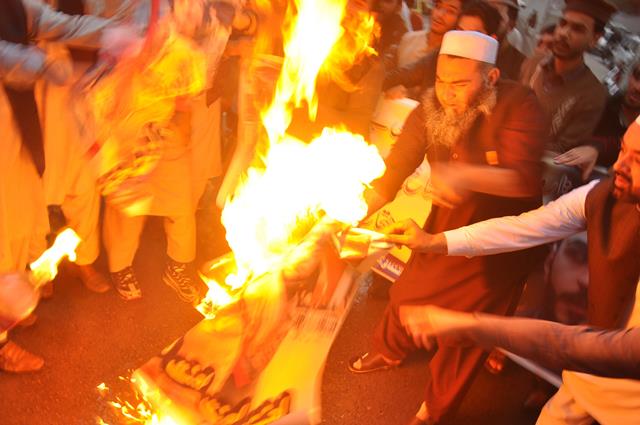 22 November 2019, Peshawar, Pakistan: Saddar trader Itefaq group burn a banner printed with the man who desecrated the Holy Quran in Norway. (photo: Hussain Ali/Pacific Press Agency/Alamy]
22 November 2019, Peshawar, Pakistan: Saddar trader Itefaq group burn a banner printed with the man who desecrated the Holy Quran in Norway. (photo: Hussain Ali/Pacific Press Agency/Alamy]
[This is an excerpt from an article in The Round Table: The Commonwealth Journal of International Affairs.]
Last August, 21 churches were burned, pastors’ and priests’ homes destroyed, and 500 families forced to flee from their homes which were looted by violent, extremist mobs enraged by an alleged desecration of the Qur’an by two teenage Christian boys. The evidence for this is two half burnt pages on which an unknown person had overwritten comments in red which are alleged to be derogatory.
These tragic events in Jaranwala in Pakistani Punjab are part of a pattern of mob attacks on Christians and others alleging blasphemy. Such attacks often result in loss of life and serious injury, as well as destruction of property and displacement of people.
Church and community leaders have been fearful that the events of Qur’an burning in Sweden and elsewhere would lead to a retaliatory attack on Christians in Pakistan and have been at pains to dissociate themselves from such actions. In spite of assurances to the contrary by leading Muslim clerics, however, the temptation to attack a vulnerable minority, unable to defend itself, has been hard to resist.
Government and judiciary in Pakistan
Special edition of The Round Table Journal: Pakistan at 75
Research Article – The rocky road to modernity: an assessment of Pakistan’s 75 years
The history of such mob behaviour goes all the way back to the Raj. This is why the British, to avoid communal conflict, enacted laws to prevent religious hatred becoming ingrained in society. The penalties involved in the conviction, however, were moderate, and there were very few prosecutions. These laws have now been radicalised, and Shari’a-based penalties introduced which prescribe mandatory death and life imprisonment punishments for various kinds of blasphemy offences. Both Muslims and non-Muslims have fallen victim to these draconian laws but, in terms of numbers, minorities have been disproportionately affected.
The oxygen for these mob attacks is a change in the mentality of large sections of the population. From a largely tolerant, Sufi and shrine-centred Islam, people’s minds and hearts have been turned to an exclusive and intolerant interpretation of their faith. Such a version was very far from the intentions of the founders of Pakistan who had an inclusivist vision, based on the principles of Islamic social justice. It represents, rather, an ideology which was opposed to the creation of Pakistan on the grounds that it would divide Muslim strength in South Asia and make the achievement of Pan-Islam more difficult.
The change has been brought about particularly by a programme of ‘Islamisation’ of law. Disregarding creative thinking by Muslims about relating Shari’a to the contemporary world, Islamic law has been enacted in its most fundamentalist forms, especially with regard to Shari’a-related offences like blasphemy. All appeals to give due regard to plural legal traditions within Islam and to Pakistan’s obligations under international law have simply been ignored.
Minds and hearts have also been changed by the widespread teaching of hate in textbooks, particularly with regard to people of other faiths. This is now strengthened by popular media programmes glorifying jihad and its pioneers and showing those of other faiths and cultures in a poor light.
A third reason for the boldness of mobs is that successive governments have repeatedly given in to extremist organisations and to street violence orchestrated by them, accepting their puritanical, ahistorical and extremist versions of Islam. People can see that street violence pays, and it is no wonder they have taken to it themselves.
Michael Nazir-Ali is President of the Oxford Centre for Training, Research, Advocacy and Dialogue (OXTRAD), London and Oxford.



